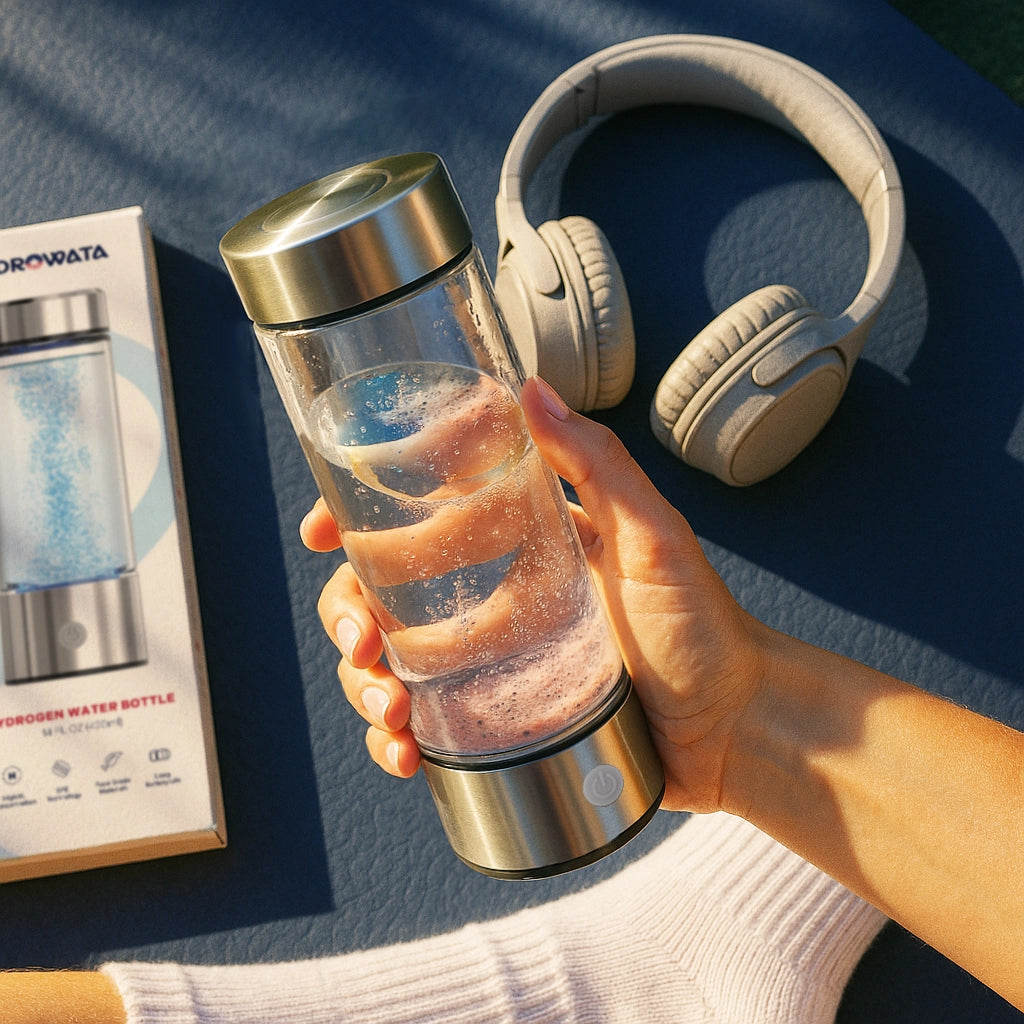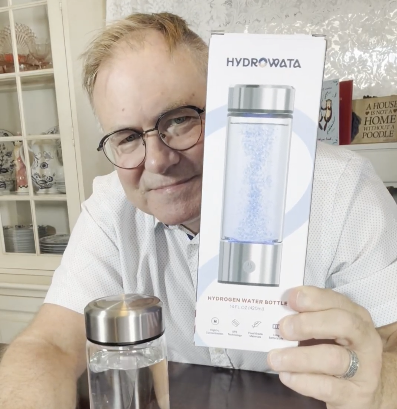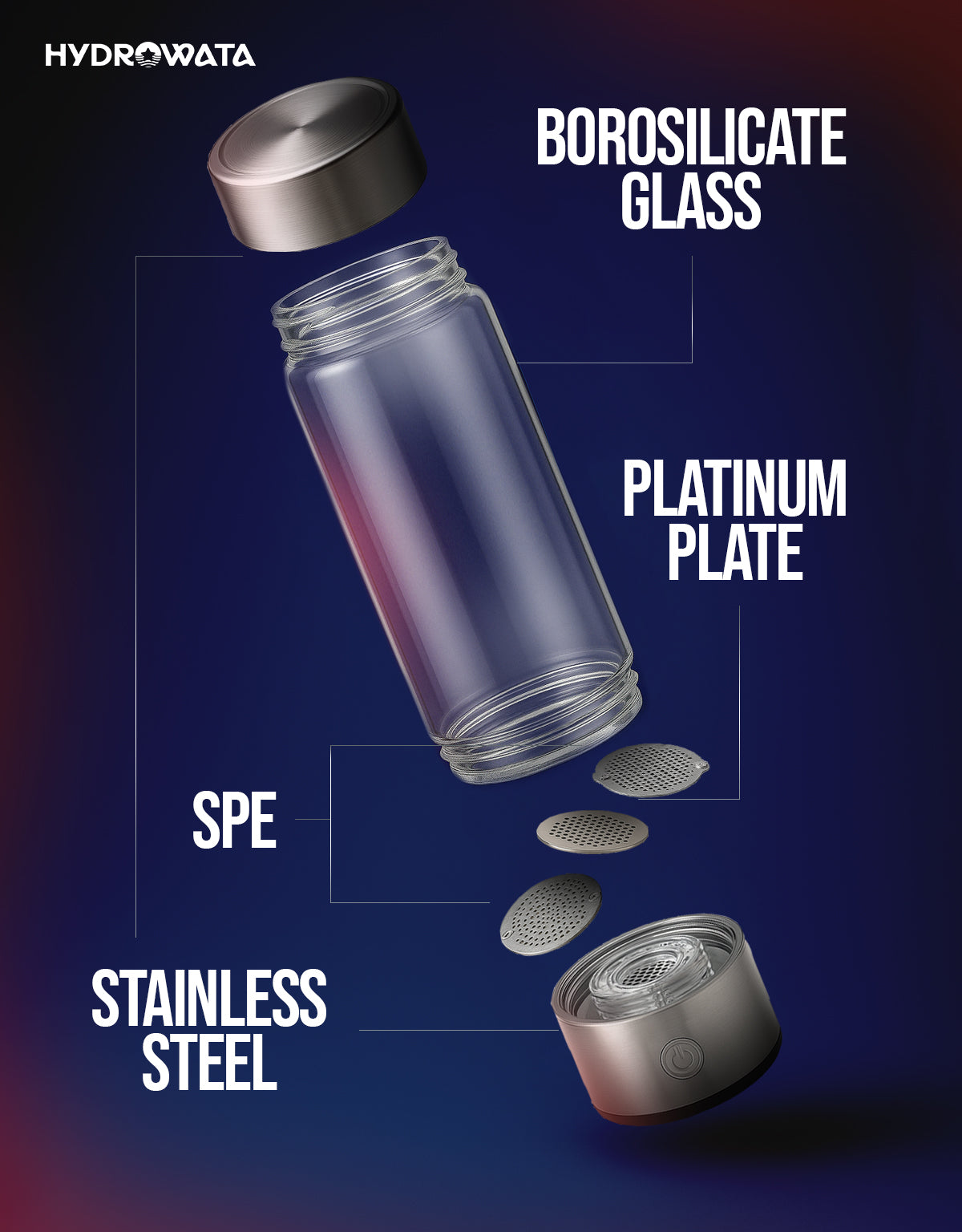30-Day Money Back Guarantee
We stand behind our product with a 100% satisfaction guarantee. If you're not completely satisfied, contact us via email: support@hydrowata.com for further support!
HydroWata Hydrogen Water Bottle
Frequently Asked Questions
Everything you need to know about our revolutionary hydrogen water technology and customer service

1. What Is Hydrogen Water?
Hydrogen water is water that has been enriched with molecular hydrogen (H₂), creating a powerful antioxidant-rich beverage that goes beyond ordinary hydration. This revolutionary drink contains dissolved hydrogen gas molecules that work to transform your daily hydration into a wellness experience.

3. How Much Hydrogen Water Should I Drink Daily?
Experts recommend drinking 1.5–2 liters of water per day. Replacing your regular water with hydrogen-rich water can be a simple yet impactful way to boost your health. Even starting with one glass a day can make a difference.
Many HydroWata users report feeling more hydrated with smaller volumes of water due to improved absorption. For optimal benefits, aim to consume at least 4-6 bottles of hydrogen water daily.
4. How Long Does Hydrogen Water Stay Charged?
Hydrogen water has different retention times depending on how it's stored:
- Open container: Hydrogen lasts only 1–2 hours in an open container.
- Sealed bottle: In an airtight container like your HydroWata bottle, hydrogen can remain active for up to 3 hours, even with occasional opening.
For best results, drink your hydrogen water within 15–30 minutes of generating it to experience maximum benefits.
5. How Do You Clean a Hydrogen Water Bottle?

6. What Materials Are Used in HydroWata Hydrogen Water Bottles?
The HydroWata Hydrogen Water Bottle is designed with safety and durability in mind. Its components include:
- Main Body: High-quality glass
- Glass Parts: Premium Glass body
- Seal: Food-grade silicone rubber
- Base: 304 stainless steel, and the platinum plate, SPE filter membrane
All materials are BPA-free and selected specifically for their durability, safety, and ability to maintain water purity.
7. Troubleshooting
My bottle is not producing bubbles anymore. What should I do?
My bottle is not producing bubbles anymore. What should I do?
If your bottle stops producing bubbles after a period of use:
- First, fully recharge the bottle's battery
- Try activating it with warm water (not hot)
- If the problem persists, it may be related to the charging base
If your bottle is still under warranty, please contact customer support with a video showing the issue for further assistance.
My bottle won't charge or the charging cable is broken. What do I do?
My bottle won't charge or the charging cable is broken. What do I do?
If your bottle is not charging:
- Determine if the issue is with the charging cable or the bottle itself
- Try a different USB cable to see if that resolves the issue
- Check that the charging contacts on the base are clean and free of debris
My bottle is leaking from the base. How can I fix it?
My bottle is leaking from the base. How can I fix it?
Leaking from the base is usually caused by an improperly adjusted sealing ring. Follow these steps:
- Check the silicone ring on the base and ensure it's properly seated
- Adjust the ring if it appears uneven or displaced
- Make sure the bottle is properly tightened to the base
If the problem persists after adjusting the ring, please send us photos or a video of the issue. If we confirm a defect, we can arrange for a replacement base or bottle.
I tested the water with a hydrogen test tool but no hydrogen was detected. Why?
I tested the water with a hydrogen test tool but no hydrogen was detected. Why?
This could be due to several factors:
- The test may have been performed too long after generating the hydrogen (hydrogen dissipates within 1-3 hours)
- The testing tool may not be sensitive enough or calibrated correctly
- There might be an issue with the electrolysis function in the base
To confirm if your bottle is working properly, please send us a video showing the bottle in operation and the testing process.
How does hydrogen water improve your overal health?
The Science: Benefits of Hydrogen Water
Antioxidant & Brain-Protective Effects
Antioxidant & Brain-Protective Effects
Hydrogen gas acts as a powerful antioxidant by targeting harmful oxygen radicals
Results: The study findings show that hydrogen gas (H₂) selectively reduces the most harmful reactive oxygen species, the hydroxyl radical, without affecting other essential ROS. In cell cultures and a rat model of brain injury caused by oxidative stress, H₂ inhalation significantly protected cells and reduced damage. These results suggest that H₂ can serve as an effective antioxidant, rapidly diffusing through membranes to neutralize harmful radicals and protect against oxidative damage.
Intravenous Hydrogen-Enriched Fluid is Safe for Stroke Patients
Results: The study findings demonstrate that the intravenous administration of hydrogen-enriched fluid, in combination with edaravone, is safe for patients with acute ischemic stroke. Specifically, the study showed that the treatment did not result in any significant adverse effects, and patients exhibited improvement in their stroke symptoms. These results indicate that hydrogen-enriched intravenous solutions may offer a safe therapeutic option for reducing the effects of oxidative stress in stroke patients.
Mood Disorders
Mood Disorders
Drinking Hydrogen Water Prevents Stress-Induced Cognitive Decline by Reducing Oxidative Stress in Mice
Results: The study demonstrates that drinking hydrogen-rich water prevents stress-induced cognitive impairments in mice by reducing oxidative stress in the brain. It also shows that hydrogen water helps protect learning and memory under chronic physical restraint, indicating its potential for preventing stress-related cognitive decline.
The Impact of Stress and Antidepressants on Adult Hippocampal Neurogenesis in Depression
Results: This study reveals that adult hippocampal neurogenesis - the creation of new neurons in the brain - is influenced by stress and antidepressants. It suggests a significant link between neurogenesis and the stress response system, particularly the hypothalamus-pituitary-adrenal (HPA) axis, which affects the onset and recovery of depression. The chapter reviews evidence on how stress and antidepressants alter neurogenesis and discusses the role of glucocorticoid hormones and their receptors in shaping mood and behavior.
Reduction of Inflammation
Reduction of Inflammation
Consumption of Hydrogen-Rich Water Reduces Oxidative Stress and Disease Activity in Rheumatoid Arthritis Patients
Results: The study findings show that drinking hydrogen-rich water significantly reduces oxidative stress and improves symptoms in patients with rheumatoid arthritis. Specifically, it lowered markers of oxidative damage by 14.3% and improved disease activity scores. Additionally, five patients with early-stage rheumatoid arthritis achieved remission, with four becoming symptom-free.
Molecular Hydrogen: A Promising Therapy for Rheumatoid Arthritis
Results: Molecular hydrogen (H₂) has shown promise in reducing oxidative stress in rheumatoid arthritis (RA) patients by selectively targeting harmful hydroxyl radicals. This suggests that H₂ therapy could boost the effectiveness of standard treatments, especially in the early stages of RA, potentially aiding in both the diagnosis and management of the disease.
Anti-inflammatory Effects of Molecular Hydrogen in Liver Inflammation
Results: Treatment with molecular hydrogen (H₂) in a hyperbaric chamber significantly reduced liver damage in infected animals. Benefits included less liver scarring, improved blood flow, increased antioxidant activity, and lower levels of harmful substances like TNF-alpha. These results suggest that hydrogen may be an effective anti-inflammatory treatment worth exploring further.
Hydrogen gas improves survival and reduces organ damage in severe inflammation
Results: The study found that inhaling 2% hydrogen gas significantly improved survival rates and reduced organ damage in a model of severe inflammation. Hydrogen treatment helped protect the lungs, liver, and kidneys by lowering oxidative stress, boosting antioxidant enzymes, and reducing inflammatory cytokines. These results suggest that hydrogen gas could be a potential therapy for conditions involving inflammation and multiple organ damage.
Promotion of Weightloss
Promotion of Weightloss
Molecular Hydrogen Improves Metabolism and Reduces Obesity in Mice
Results: This study shows that drinking hydrogen-rich water (H₂-water) enhances metabolism and reduces obesity and diabetes in mice. H₂ accumulates in the liver, lowering oxidative stress and alleviating fatty liver. Long-term H₂-water consumption led to reduced body weight and improved metabolic markers, similar to dietary restriction. The study also found increased production of FGF21, a hormone that boosts energy metabolism. These results suggest that molecular hydrogen could be beneficial for managing obesity and diabetes.
Enhancement of Athletic and Muscular Performance
Enhancement of Athletic and Muscular Performance
Hydrogen-Rich Water Reduces Muscle Fatigue in Athletes
Results: The study shows that drinking hydrogen-rich water (HW) significantly decreases muscle fatigue in elite soccer players after intense exercise. Athletes consuming HW did not experience the usual rise in blood lactate levels, indicating less fatigue, and maintained better muscle performance compared to those drinking placebo water. These findings suggest that hydrogen-rich water is an effective hydration method to improve exercise performance in athletes.
Hydrogen-Rich Water Enhances Sprint Performance in Cyclists
Results: The study finds that consuming hydrogen-rich water (HRW) over two weeks helps trained cyclists maintain their peak power output (PPO) during repeated sprints in a 30-minute cycling exercise. While the placebo group showed a significant decline in PPO during the latter sprints, the PPO remained stable in the HRW group. Additionally, both groups experienced increased lactate levels and decreased pH and bicarbonate, indicating exercise-induced fatigue. These results suggest that hydrogen-rich water may improve performance during high-intensity, intermittent exercise.
Molecular Hydrogen Reduces Muscle Degeneration in Duchenne Muscular Dystrophy Model
Results: This study demonstrates that molecular hydrogen (H₂) alleviates motor deficits and muscle degeneration in mdx mice, a model for Duchenne muscular dystrophy (DMD). Mice given hydrogen water showed normal weight gain, improved running distance, and longer rota-rod durations. Additionally, hydrogen treatment lowered plasma creatine kinase levels and reduced central nuclei in muscle fibers, indicating decreased muscle damage. These results suggest that hydrogen may have therapeutic potential for improving muscle function in DMD patients.
Management of Diabetes
Management of Diabetes
Hydrogen-Rich Water Improves Lipid and Glucose Metabolism in Diabetic Patients
Results: The study findings indicate that consuming hydrogen-rich water can enhance lipid and glucose metabolism in individuals with type 2 diabetes and impaired glucose tolerance. Specifically, the research showed significant reductions in harmful modified LDL cholesterol and urinary oxidative stress markers. Additionally, hydrogen-rich water intake improved insulin sensitivity, with some patients normalizing their glucose tolerance. These results suggest that hydrogen-rich water may help prevent type 2 diabetes and insulin resistance.
Low Water Intake Linked to Increased Risk of Hyperglycemia
Results: The study findings indicate that low water intake is associated with a higher risk of developing hyperglycemia in middle-aged adults. Specifically, individuals consuming less than 0.5 liters of water daily had a significantly increased risk, while those drinking between 0.5 to 1.0 liters showed a lower risk. These results suggest that adequate water intake may play a protective role against the onset of hyperglycemia.
Improvement of Skin Health
Improvement of Skin Health
Hydrogen Treatment Shows Promise for Acute Skin Diseases
Results: The study found that hydrogen (H₂) treatment effectively alleviated symptoms in four patients with acute erythematous skin diseases, with no adverse effects reported. A feasibility assessment revealed that hydrogen levels rose quickly in the blood during inhalation and remained on the skin surface afterward. These findings suggest that hydrogen treatment may be a safe and effective option for managing acute skin conditions.
Hydrogen-Rich Electrolyzed Warm Water Reduces Wrinkles and Boosts Collagen
Results: The study shows that hydrogen-rich electrolyzed warm water (HW) significantly reduces wrinkles and enhances type-I collagen production in skin cells. HW treatment increased collagen synthesis in fibroblasts and protected keratinocytes from UVA damage. A clinical trial found that daily HW bathing improved wrinkles in several participants after three months. These findings suggest that HW may be an effective daily skincare option for reducing UV-related skin damage.
Help Combat Allergies
Help Combat Allergies
Molecular Hydrogen Prevents Allergic Reactions by Modulating Mast Cell Signaling
Results: The study demonstrates that drinking hydrogen-rich water effectively reduces immediate allergic reactions in mice. Hydrogen suppresses key mast cell signaling pathways, particularly inhibiting FcepsilonRI-mediated phosphorylation and NADPH oxidase activity. Unlike its traditional role as a radical scavenger, hydrogen in this case benefits allergic responses by specifically modulating cellular signaling rather than eliminating hydroxyl radicals. These findings suggest hydrogen could play a broader role in regulating signaling pathways in various diseases.
Help Prevent Hearing Loss
Help Prevent Hearing Loss
Hydrogen Protects Auditory Hair Cells from Free Radical Damage
Results: The study demonstrates that hydrogen protects auditory hair cells from damage caused by reactive oxygen species (ROS). Hydrogen-saturated media significantly reduced ROS generation and lipid peroxidation in auditory epithelia, leading to increased hair cell survival. This suggests that hydrogen may safeguard hair cells from oxidative damage due to aging, noise exposure, or ototoxic drugs.
Hydrogen-Rich Saline Reduces Noise-Induced Hearing Loss in Guinea Pigs
Results: The study shows that hydrogen-rich saline effectively alleviates noise-induced cochlear injury in guinea pigs. Specifically, it significantly reduces the auditory brainstem response (ABR) threshold shift and improves outer hair cell function compared to normal saline and noise-only controls. Additionally, hydrogen-rich saline helps protect cochlear hair cells from damage after exposure to intense noise, suggesting its potential as a treatment for hearing loss.
Hydrogen-Saturated Saline Protects Against Noise-Induced Hearing Loss in Guinea Pigs
Results: The study findings indicate that hydrogen-saturated saline effectively protects against hearing loss caused by intense narrow band noise in guinea pigs. Specifically, pre-treatment with hydrogen-saturated saline significantly reduces hair cell damage and hearing loss compared to normal saline. The results show lower levels of harmful free radicals, such as malondialdehyde and hydroxyl, after noise exposure, suggesting that hydrogen-saturated saline acts as an antioxidant. These findings support its potential as a protective treatment against noise-induced hearing loss.
Hydrogen-Rich Water Reduces Noise-Induced Hearing Loss in Guinea Pigs
Results: The study findings show that drinking hydrogen-rich water helps lessen hearing loss caused by loud noise exposure in guinea pigs. Specifically, the research revealed that guinea pigs consuming hydrogen-rich water had significantly better auditory brainstem response (ABR) thresholds and improved distortion-product otoacoustic emissions (DPOAEs) after noise exposure compared to those drinking regular water. These results indicate that hydrogen may aid in the recovery of hair cell function and mitigate temporary hearing loss from noise damage.
Eyes Health Preservation
Eyes Health Preservation
Hydrogen-Loaded Eye Drops Protect Retina from Ischemia-Reperfusion Injury
Results: The study shows that hydrogen-loaded eye drops effectively protect the retina from ischemia-reperfusion injury in rats. Administering these drops during and after increased intraocular pressure reduced oxidative stress and apoptosis in retinal cells, improving retinal thickness recovery by over 70%. These findings suggest that hydrogen eye drops are a promising neuroprotective therapy for acute retinal injuries.
Hydrogen and NAC Reduce Angiogenesis After Corneal Alkali Injury
Results: This study shows that hydrogen and N-acetyl-L-cysteine (NAC) significantly reduce angiogenesis caused by oxidative stress in a mouse model of corneal alkali burns. Elevated reactive oxygen species (ROS) were associated with increased angiogenesis after injury. Treatment with hydrogen or NAC effectively inhibited angiogenesis by targeting the NF-κB pathway. These results suggest that hydrogen-enriched solutions can serve as an effective antioxidant therapy to prevent blindness from alkali burns.
Protect Your Heart
Protect Your Heart
Hydrogen Water Reduces Cardiac Dysfunction in Diabetic Mice
Results: This study shows that hydrogen water significantly enhances cardiac function in diabetic mice induced by streptozotocin. While blood glucose levels were unaffected, treatment reduced cardiac hypertrophy and fibrosis, decreased harmful protein expression, and alleviated oxidative stress and inflammation. These results suggest that molecular hydrogen could be an effective approach for managing diabetic cardiomyopathy, independent of blood sugar levels.
Protect the Liver
Protect the Liver
Hydrogen-Rich Water Reduces Oxidative Stress and Improves Liver Function in Chronic Hepatitis B Patients
Results: The study demonstrates that hydrogen-rich water (HRW) significantly reduces oxidative stress in patients with chronic hepatitis B (CHB). While oxidative stress levels remained unchanged in the routine treatment group, the hydrogen treatment group experienced marked improvements. Additionally, liver function improved significantly, and HBV DNA levels decreased after HRW treatment. Although both groups showed improved liver function tendencies, further long-term studies are needed to confirm HRW's impact on liver function and viral load.
Hydrogen Water Reduces Liver Fibrosis in Mice by Scavenging Hydroxyl Radicals
Results: The study demonstrates that oral hydrogen water significantly decreases liver fibrogenesis in mice, particularly in carbon tetrachloride and thioacetamide models, but not in the bile duct ligation model. Hydrogen-rich medium effectively reduced harmful hydroxyl radicals and protected hepatocytes from injury caused by antimycin A, although it did not prevent hepatic stellate cell activation. These findings indicate that hydrogen water protects liver cells by scavenging hydroxyl radicals, thereby inhibiting liver fibrogenesis.
Hydrogen Water Improves Heart Function in Diabetic Mice
Results: The study shows that hydrogen water significantly alleviates cardiac dysfunction in diabetic mice. While it did not lower blood glucose levels, it reduced cardiac hypertrophy and fibrosis, enhancing heart function. The treatment also decreased oxidative stress and inflammation, indicating that molecular hydrogen may be a beneficial strategy for managing diabetic heart disease.







